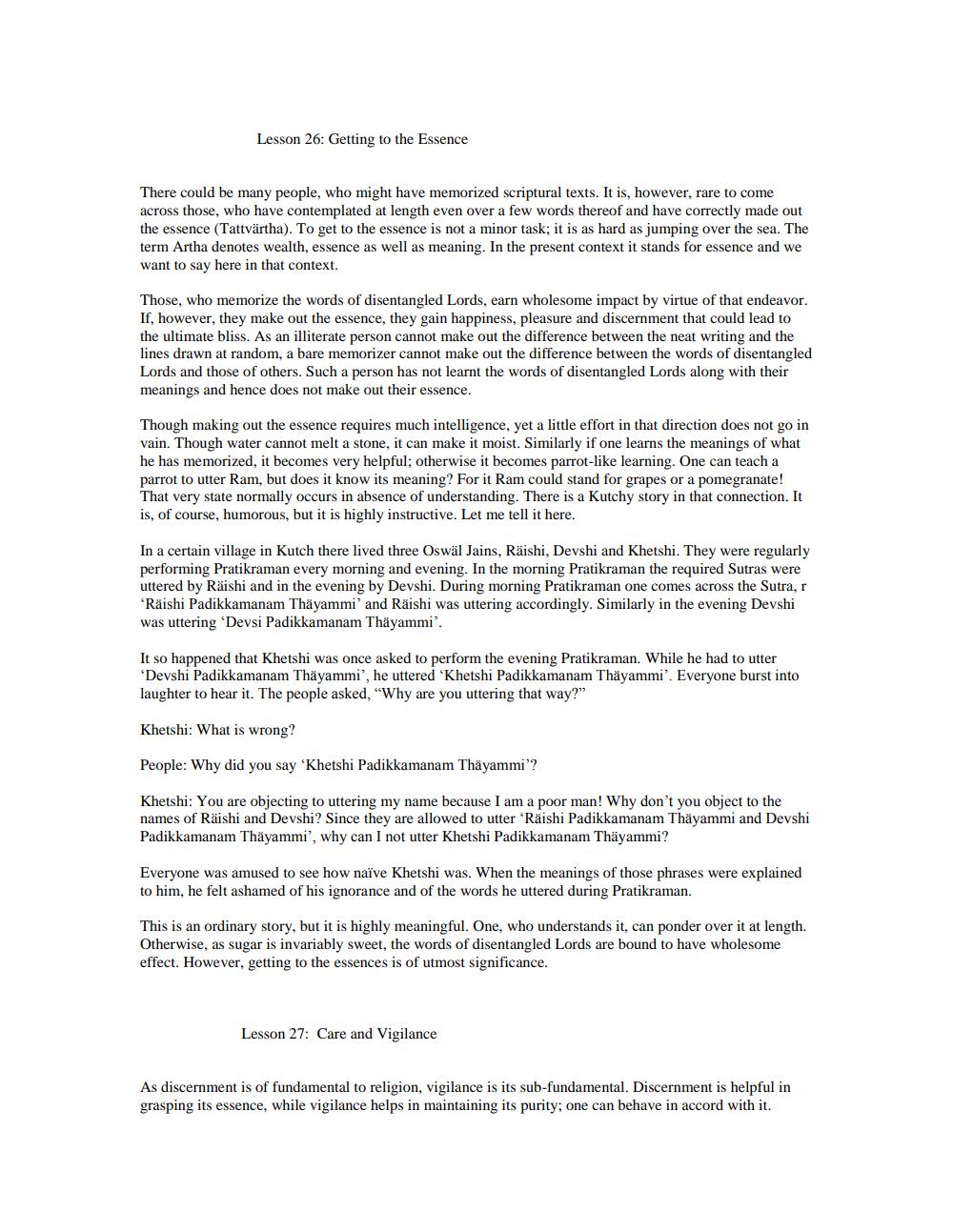________________
Lesson 26: Getting to the Essence
There could be many people, who might have memorized scriptural texts. It is, however, rare to come across those, who have contemplated at length even over a few words thereof and have correctly made out the essence (Tattvärtha). To get to the essence is not a minor task; it is as hard as jumping over the sea. The term Artha denotes wealth, essence as well as meaning. In the present context it stands for essence and we want to say here in that context.
Those, who memorize the words of disentangled Lords, earn wholesome impact by virtue of that endeavor. If, however, they make out the essence, they gain happiness, pleasure and discernment that could lead to the ultimate bliss. As an illiterate person cannot make out the difference between the neat writing and the lines drawn at random, a bare memorizer cannot make out the difference between the words of disentangled Lords and those of others. Such a person has not learnt the words of disentangled Lords along with their meanings and hence does not make out their essence.
Though making out the essence requires much intelligence, yet a little effort in that direction does not go in vain. Though water cannot melt a stone, it can make it moist. Similarly if one learns the meanings of what he has memorized, it becomes very helpful; otherwise it becomes parrot-like learning. One can teach a parrot to utter Ram, but does it know its meaning? For it Ram could stand for grapes or a pomegranate! That very state normally occurs in absence of understanding. There is a Kutchy story in that connection. It is, of course, humorous, but it is highly instructive. Let me tell it here.
In a certain village in Kutch there lived three Oswäl Jains, Räishi, Devshi and Khetshi. They were regularly performing Pratikraman every morning and evening. In the morning Pratikraman the required Sutras were uttered by Räishi and in the evening by Devshi. During morning Pratikraman one comes across the Sutra, r *Räishi Padikkamanam Thayammi' and Räishi was uttering accordingly. Similarly in the evening Devshi was uttering 'Devsi Padikkamanam Thayammi'.
It so happened that Khetshi was once asked to perform the evening Pratikraman. While he had to utter Devshi Padikkamanam Thäyammi', he uttered 'Khetshi Padikkamanam Thạyammi'. Everyone burst into laughter to hear it. The people asked, "Why are you uttering that way?"
Khetshi: What is wrong?
People: Why did you say "Khetshi Padikkamanam Thayammi'?
Khetshi: You are objecting to uttering my name because I am a poor man! Why don't you object to the names of Räishi and Devshi? Since they are allowed to utter "Räishi Padikkamanam Thayammi and Devshi Padikkamanam Thayammi', why can I not utter Khetshi Padikkamanam Thayammi?
Everyone was amused to see how naïve Khetshi was. When the meanings of those phrases were explained to him, he felt ashamed of his ignorance and of the words he uttered during Pratikraman.
This is an ordinary story, but it is highly meaningful. One, who understands it, can ponder over it at length. Otherwise, as sugar is invariably sweet, the words of disentangled Lords are bound to have wholesome effect. However, getting to the essences is of utmost significance.
Lesson 27: Care and Vigilance
As discernment is of fundamental to religion, vigilance is its sub-fundamental. Discernment is helpful in grasping its essence, while vigilance helps in maintaining its purity; one can behave in accord with it.




